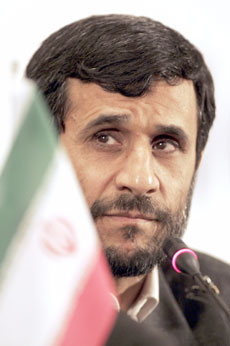|
Iran rejects Europe reactor offer
(Reuters)
Updated: 2006-05-17 15:07 TEHRAN - Accepting EU incentives that urge Iran to
stop making atomic fuel would be like trading candy for gold, Iranian President
Mahmoud Ahmadinejad said on Wednesday.
Britain, France and Germany, the
European Union's three biggest powers, plan to offer Iran a light-water reactor
as part of a package to induce Tehran to freeze a uranium enrichment programme
that the West suspects has military dimensions.

Iranian President
Mahmoud Ahmadinejad listens to a question during a news conference at the
D-8 summit for the group of developing nations in Nusa Dua on the
Indonesian island of Bali May 13, 2006. Ahmadinejad rejected on Wednesday
the Europe incentives on its nulcear program, branding it like trading
candy for gold. [Reuters] |
"They say we want
to give Iranians incentives but they think they are dealing with a
four-year-old, telling him they will give him candies or walnuts and take gold
from him in return," Ahmadinejad told a crowd in the central city of Arak.
Arak is the site of a heavy-water nuclear reactor that Iran is building
despite opposition from Western countries concerned that the plant's plutonium
by-product could be used in warheads.
"Iran will not accept any
suspension or freeze (of nuclear work)," he added in a speech broadcast live on
state televisio.
The EU seeks an end to Iran's nuclear fuel activities
as the only credible guarantee that it is not making atomic weapons. Tehran
insists it needs the fuel only for power stations.
"We trusted you three
years ago and accepted suspension but unfortunately this proved to be a bitter
experience in Iranian history. We will not be bitten by the same snake twice,"
Ahmadinejad declared.
Iran suspended uranium enrichment work in 2003 as
a goodwill gesture while it tried to forge a diplomatic solution to the
stand-off in talks with France, Germany and Britain.
But the diplomacy
failed and Iran resumed work on atomic fuel in August last
year.
WITHDRAWAL FROM NPT?
Ahmadinejad warned
that pressure on Iran over its nuclear programme could produce adverse
reactions. "Don't force governments and nations which are signatories to the
nuclear Non-Proliferation Treaty to pull out of it," he said.
Senior
diplomats from the EU trio and the office of EU foreign policy chief Javier
Solana are now expected to discuss their Iran proposal with U.S., Russian and
Chinese counterparts in London next week, not on Friday as earlier planned.
"The package has not yet been agreed," U.S. Undersecretary of State
Nicholas Burns told Reuters. "It is under development and we'll be meeting
probably next week in Europe to look at it. I'll be going over to London for
conversations."
An EU diplomat familiar with the negotiations on Iran
said on Tuesday the EU3 and Solana were planning to offer Tehran a European
light-water reactor if it suspended enrichment.
Nuclear experts say
light-water reactors are harder to use for weapons purposes than heavy-water
plants such as the one under construction in Arak.
The EU trio first
proposed offering Iran light-water technology in 2005, after two years of
negotiations. At the time, the Iranians said the offer lacked specific
incentives.
EU diplomats said the new offer would be more specific,
partly because they were confident of full U.S. support.
But they made
clear they saw little prospect that Iran would accept, and were aiming above all
to demonstrate to sceptics such as Russia and China that the West was not trying
to deprive Iran of civilian nuclear energy.
|
| |
|
| |
|
|
|
| Most Commented/Read Stories in 48 Hours |
|
|
|
|